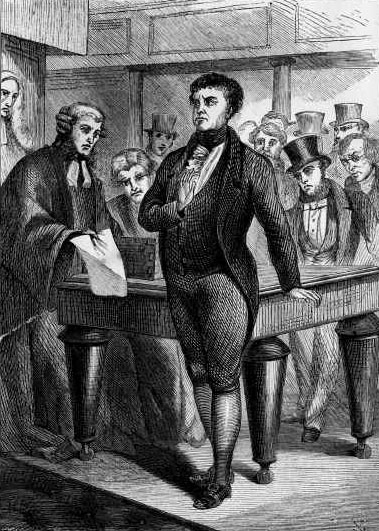The Catholic Party in Ireland
During the time of O'Connell's retirement and study, he had but too many opportunities of knowing how little justice was likely to be meted out to Irishmen accused, justly or unjustly, of political crimes; and, doubtless, he directed his studies to those special points most likely to be helpful hereafter. Robert Emmet's execution took place in October, 1803; and from that hour, until the accession of the Whigs to office, in 1806, Ireland was ruled by martial law.

Daniel O'Connell refusing to take the Oath
The Habeas Corpus Act and trial by jury were suspended, and the jails and transport ships were crowded with the victims of military ferocity and magisterial vengeance. In the debate of 1805, when the Catholic petition was brought into the House of Commons by Mr. Fox, and treacherously opposed by Pitt, Mr. Ponsonby exclaimed, speaking of the Irish Catholics: "I know them well; and I know, at the same time, that whatever is good in them, they owe to themselves; whatever is bad in them, they owe to you, and to your bad government." Mr. Grattan accused the English Tories of "running about like old women in search of old prejudices; preferring to buy foreign allies by subsidies, rather than to subsidize fellow-subjects by privileges. " He might have said by justice, for the Irish have never asked for privileges; they ask simply for the same justice as is shown to English subjects. Mr. Foster, the last Speaker of the Irish House of Commons, declared that, "under the Union Act, by compact, the Protestant boroughs were suppressed, and a compensation of £1,400,000 paid to Protestant owners, and not one shilling to the Catholics."
O'Connell came prominently forward as a leader of the Catholic party in 1810. A meeting was held in the Royal Exchange, Dublin, to petition for Repeal of the Union, at which the High Sheriff of that city presided, and many distinguished men were present—a proof that, however corrupted Irish Parliaments may have been by English gold, there was still some advantage to be gained to the country by possessing even a partial independence. O'Connell's speech was published, and circulated widely. To give the full details of his career as a leader of the people, would require a volume the size of the present work; to give even a sufficiently comprehensive outline, would require several chapters: I can but hope that some able hand will take up the subject, and with equal earnestness do I hope that it may be some one really capable of doing justice to it. One who would write the "Life and Times of O'Connell" as such a work should be written, would require to bring more than ordinary abilities to the task, and would deserve, at the hands of his countrymen, the highest expression of gratitude which they could give. Such a work would be incomparably the noblest monument which could be dedicated to his memory.
